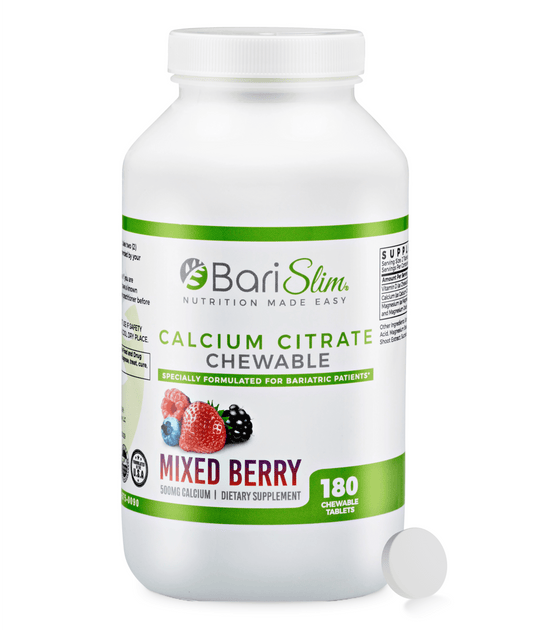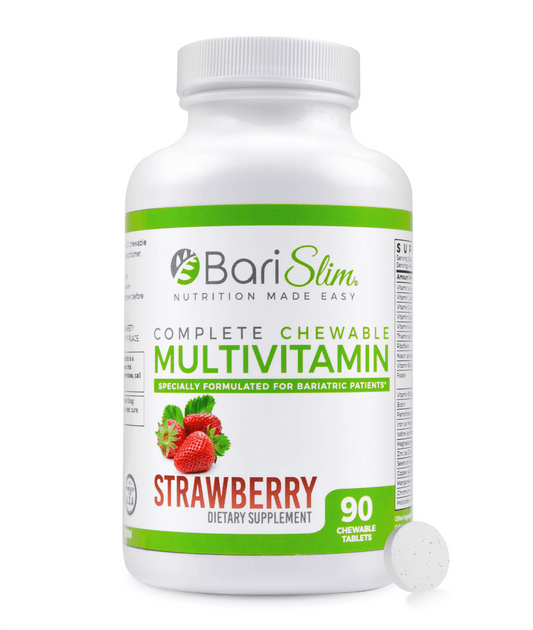Table of Contents
- Key Takeaways
- Common Causes of Postoperative Abdominal Pain
- Pain From Improper Diet After Surgery
- Pain From Bacterial Overgrowth
- Pain From Gastrointestinal Motility Disorders
- Pain From Constipation
- Worsening Irritable Bowel Syndrome
- Pain From Esophageal Motility Disorders
- Biliary Colic Pain
- Potential Uncommon Causes of Pain After Bariatric Surgery
- Pain From Dumping Syndrome
- Choledocholithiasis Pain
- How To Deal with Pain After Bariatric Surgery
- How Long Does Pain Last After Bariatric Surgery?
- How Bad Is the Pain After Bariatric Surgery?
Going through bariatric surgery can bring various concerns, the most common being pain. Whether you are considering this weight loss procedure or you have already had it, it's essential to understand the potential pain associated with bariatric surgery and how to manage it.
As with any surgery, it's normal to experience some degree of pain following a bariatric procedure. Generally, pain is felt in the abdominal area and may range from mild to moderate, depending on individual factors. While pain management is crucial to the healing process, it is also helpful to be aware of uncommon causes of postoperative pain and how to address them.
Key Takeaways
- Bariatric surgery may involve abdominal pain after the procedure
- Recognizing uncommon sources of pain post-surgery is important
- Appropriate pain management and an understanding of the expected duration can aid in the recovery process
Common Causes of Postoperative Abdominal Pain
Pain From Improper Diet After Surgery
After bariatric surgery, one of the most important factors you can control is following the recommended dietary guidelines provided by your doctor. This typically includes suggested meal plans and portion sizes with the elimination of certain foods that are too high in fat, sugar, or fiber. Pain from improper diet after surgery can be minimized by gradually introducing solid foods while monitoring your tolerance.
Pain From Bacterial Overgrowth
The surgery may change your gut bacteria, potentially leading to bacterial overgrowth. This condition can cause abdominal gas and bloating, leading to abdominal pain.
Pain From Gastrointestinal Motility Disorders
Bariatric surgery can alter the normal movement of food through your digestive tract, known as motility. Motility issues may cause abdominal pain, nausea, or vomiting. Speak with your doctor about appropriate interventions, including adjusting your diet or medications.

Pain From Constipation
Constipation is common after bariatric surgery, often due to slower bowels, bowel obstruction, or pain medication use. In addition to increasing fiber and fluid intake, consider incorporating gentle physical activity into your daily routine to stimulate bowel movements.
Worsening Irritable Bowel Syndrome
Some people experience a worsening of their existing irritable bowel syndrome (IBS) after bariatric surgery. Similar to bacterial overgrowth, abdominal pain and gas can be present. Your doctor may recommend dietary and lifestyle changes or medication adjustments to manage symptoms.
Pain From Esophageal Motility Disorders
Bariatric surgery can impact the movement of your esophagus, causing pain or discomfort. Esophageal motility disorders may result in difficulty swallowing and heartburn. Be mindful of your eating habits, taking smaller bites and chewing thoroughly. Consult your doctor if symptoms persist or worsen.
Biliary Colic Pain
Gallstones can develop after bariatric surgery due to rapid weight loss. These stones can cause biliary colic, a sudden and severe abdominal pain. Contact your healthcare provider for an evaluation and treatment plan if you suspect gallstones.
Potential Uncommon Causes of Pain After Bariatric Surgery
Bariatric surgery helps many people with obesity lose weight and improve their overall health. While pain is a common part of the recovery process, you should be aware of a few uncommon causes of pain after weight loss surgery.

Pain From Dumping Syndrome
Dumping syndrome is a complication that can occur after certain bariatric surgeries, such as gastric bypass or sleeve gastrectomy. This occurs when food moves too quickly from your small pouch (created by the surgery) to the small intestine. The rapid movement can cause symptoms like:
- Nausea and vomiting
- Abdominal pain and cramping
- Diarrhea
- Dizziness
- Sweating
This complication is typically associated with high-sugar or high-fat foods. To minimize the risk of dumping syndrome, focus on consuming small, nutritious meals and avoid high sugar or fat content.
Choledocholithiasis Pain
Choledocholithiasis refers to gallstones in the bile duct, which could cause pain after bariatric surgery, especially in procedures like Roux-en-Y gastric bypass, sleeve gastrectomy, and lap-band surgery. Gallstones can form as a result of rapid weight loss and may lead to complications like:
- Severe abdominal pain
- Swelling at the incision site
- Jaundice
- Infection
If you experience symptoms of choledocholithiasis, it's important to consult your doctor for a proper diagnosis and treatment. In some cases, gallbladder removal may be necessary to alleviate pain and prevent complications.
Remember that while these uncommon causes of pain after bariatric surgery are possible, they are not present in every case. Staying informed and maintaining open communication with your healthcare team can help ensure your recovery is as smooth and pain-free as possible.
How To Deal with Pain After Bariatric Surgery
After undergoing bariatric surgery, such as gastric bypass or sleeve gastrectomy, it is normal to experience some pain and discomfort. Here are some tips on managing pain and promoting healing after your weight loss surgery:
-
Follow your surgeon's advice: Your surgeon understands your specific situation and will provide personalized recommendations to manage pain and minimize complications. Ensure you follow their advice regarding medications, diet, and activity level.
-
Take pain medication as prescribed: Your surgeon will likely prescribe pain medication to alleviate pain after surgery. Make sure to take it as directed and never exceed the recommended dosage. Contact your surgeon if the pain is not well-managed or you experience side effects like nausea or vomiting.
-
Monitor for signs of complications: While some pain and swelling are expected after bariatric surgery, watch for signs of possible complications, such as increased pain, redness, or pus at the incision site, fever, cough, or difficulty breathing. These could indicate issues like infection or pneumonia, so contacting your surgeon promptly is crucial.
-
Implement dietary guidelines: Following your postoperative diet is essential for weight loss success and limiting pain and discomfort. Start with clear liquids and gradually progress to pureed, soft, and eventually solid foods, as your surgeon advises. Incorporate fiber into your diet to avoid constipation, which can exacerbate pain.
-
Avoid straining the surgical area: Be careful when moving, as strenuous activity and heavy lifting can strain your incision site and cause pain. Gradually ease back into daily activities and light exercise, keeping within the limits set by your surgeon.
- Address any underlying conditions: Managing related health concerns, such as GERD, sleep apnea, and high blood pressure, may make the recovery process smoother and more comfortable. Follow your healthcare team's guidance to address these issues through lifestyle changes and appropriate medical treatment.
Remember, recovering from bariatric surgery is an individual process. Stay patient, communicate with your surgeon, and monitor your progress. By taking the appropriate steps and adhering to these guidelines, you can manage pain effectively and promote a successful recovery.

How Long Does Pain Last After Bariatric Surgery?
After undergoing bariatric surgery, you might experience some discomfort and pain. The intensity and duration of pain can vary depending on the type of surgery, your individual pain tolerance, and the success of pain management techniques used by your healthcare team.
In general, pain after bariatric surgery tends to be the most intense in the first 24 to 72 hours. During this time, your surgical team will provide you with appropriate pain relief medications to help manage your discomfort. As your body starts to heal, the pain should gradually decrease, usually within a week to ten days.
Some patients may have mild to moderate pain for a few weeks after surgery. This can be due to factors such as slow healing or minor inflammation around the surgical site. Over-the-counter pain medications and anti-inflammatory drugs may be recommended in these cases to help alleviate discomfort.
It's important to follow your surgeon's instructions regarding pain management and to communicate any concerns or questions about your recovery process. By doing so, you can ensure a smoother, more comfortable healing experience after your bariatric surgery.
How Bad Is the Pain After Bariatric Surgery?
Everyone's experience with pain after bariatric surgery will differ, but it is important to understand what you can expect following the procedure. Postoperative discomfort is a normal part of the recovery process, and you will likely experience some level of pain.
Initially, you may feel pain and soreness in the areas where incisions were made. This may last for a few days to a week after surgery. To help manage the pain, your medical team will likely prescribe pain-relief medications. Following their instructions and dosage recommendations is crucial to ensure a comfortable recovery.
Aside from incisional pain, you may experience gas or bloating. This is caused by the air introduced to the abdomen during surgery and gas accumulation in the stomach and intestines. Your doctor might recommend walking around or using over-the-counter gas relief medications to alleviate this discomfort.
Another source of discomfort is muscle cramps or muscle spasms, particularly in the abdominal area. These usually occur as your internal muscles adjust to the changes made during surgery. Stretching exercises, gentle massage, or a heating pad can help ease this pain.
In summary, pain after bariatric surgery is to be expected, but it is generally manageable. By following your medical team's advice and taking the proper steps to alleviate discomfort, you can work towards a smooth recovery. Remember that the pain is temporary, and the benefits of a healthier, more active lifestyle will soon follow.
Also Read: Need to Know Information about Gastric Sleeve Surgery



 Order Free Sample
Order Free Sample





